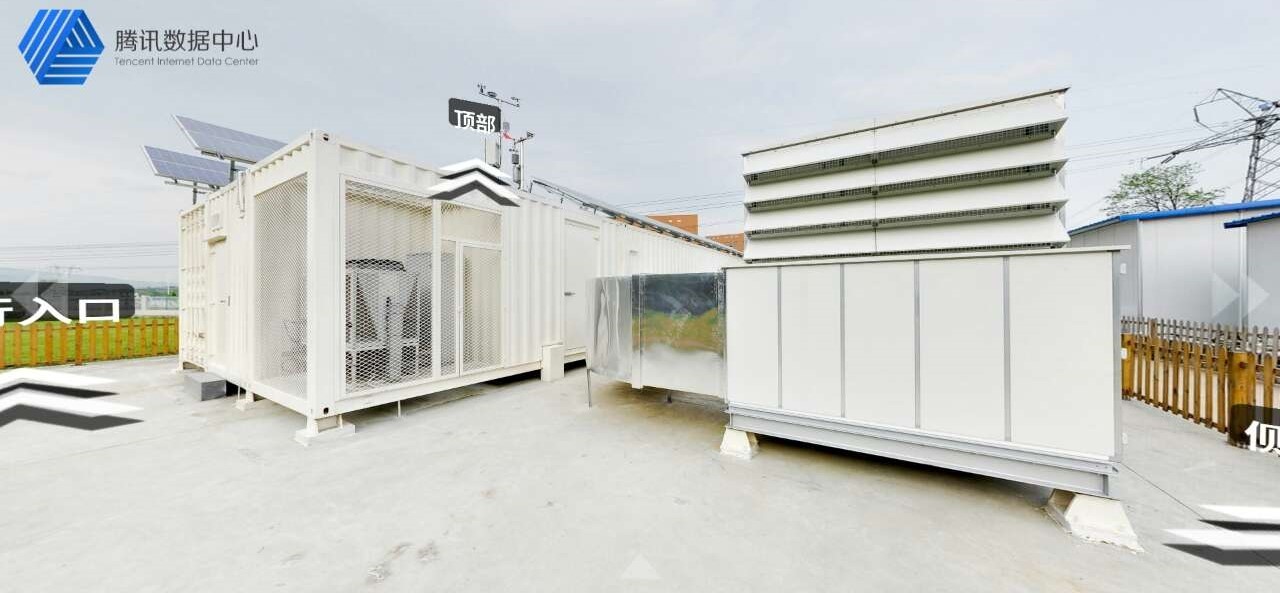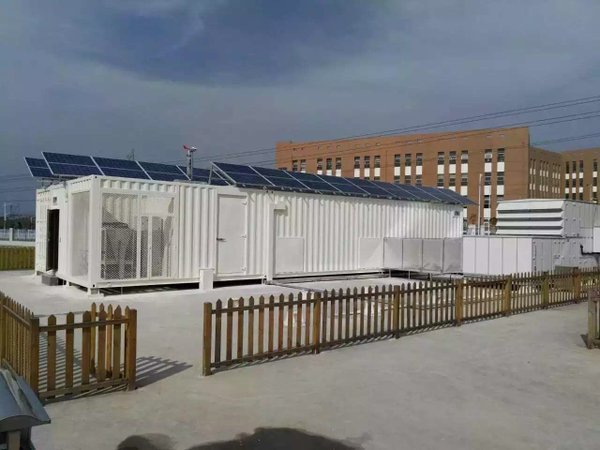Modular data centers from China and Asia
Many people think that a data center is just a server room. Ninety percent of all the information that has accumulated over the past decades, and also transmitted to each other through the global Internet, has all become a reality thanks to the data center. More and more companies, enterprises, ordinary users and governments around the world depend on computer systems, software and networks, which in turn depend on data centers. Infrastructure helps companies in business management, officials - in managing the country and ordinary people to exchange information and more.

The daily increase in needs forced owners of data centers to increase their infrastructure and computing power as a whole with minimal costs. To reduce costs to a minimum allows the concept of a modular data center, which at any time makes it possible to flexibly increase their consumer capacities at the moment. In this way, owners avoid capital and operating costs and effectively satisfy the end customer. The market for modular solutions is gaining more and more popularity among data centers. Recently, new information about modular data centers from Tencent, ZTE and Minkels has appeared.
Chinese telecommunications company Tencent Holdings (the largest Internet provider) and the second largest telecommunications equipment manufacturer ZTE CORPORATION , jointly developed and implemented a modular container data center. They have achieved record levels of energy efficiency, with an estimated energy efficiency ratio (PUE) of 1.0665. The data center receives energy from a solar farm located on the roof. This figure is astounding, because most data centers located in China have a PUE score above 2.2, according to data provided by ZTE CORPORATION.

The commercial data center is called Tencent West Lab. It will provide an opportunity to rent to other companies standard container blocks based on the ZTE T-block, in which they will place their server equipment. These modules will be mobile and at the request of customers, they can be moved around the campus. After the customer makes the order, the modular unit is delivered on campus and proceed with the installation of additional, individual modular units and client equipment inside the container. This equipment is installed and put into operation within two weeks after delivery to the site.


It is planned to use an indirect evaporative cooling system for equipment in containers. Part of the electricity will come from the solar panel, which directly converts solar energy into direct current. Additional electricity will flow through the high voltage direct current (HVDC) power line to save.
The software that is used to manage individual container blocks is called iDCIM (developed by ZTE). On-campus physical assets are managed using the RFID radio tag system .
ZTE is marketed as China's largest enterprise-class networking equipment manufacturer, and Tencent is a holding company. She owned numerous Internet services and data centers. Previously, the companies cooperated and together implemented the data center, which is located in the city - Shenzhen. A micro-modular solution was applied there, which allows you to quickly and efficiently deploy additional computing power while achieving a high level of energy efficiency.

Two more fairly large Asian companies Foxconn (the world's largest electronics manufacturer) and Huawei (one of the largest Chinese companies in the field of information and communication technologies) also entered the market of modular container data centers. Foxconn has a patent for the design of a modular data center, which is powered by renewable energy sources, and Huawei has developed containers capable of working in harsh climatic conditions with outdoor temperatures from -40 ° C to +55 ° C.
The company Minkels is engaged in the production of auxiliary equipment for data centers and enters the European market with a modular micro data center MatrixCube. This decision is aimed at small and medium-sized businesses. According to the latest data, the product has already gone on sale in countries such as: Belgium and the Netherlands. In the near future it will be available in other European markets, including the UK and France. MatrixCube is a product that allows companies to keep the computing infrastructure in their hands and not to provide their valuable data and business tasks to third-party colocation providers.

The system consists of two server racks and a DX cooling system (air cooler with direct evaporative cooling) and an internal rack-mount power distribution system. It also includes an uninterruptible power system and a remote monitoring mechanism. Minkels engineers have been able to achieve increased energy efficiency inside the MatrixCube using airflow optimization.

The daily increase in needs forced owners of data centers to increase their infrastructure and computing power as a whole with minimal costs. To reduce costs to a minimum allows the concept of a modular data center, which at any time makes it possible to flexibly increase their consumer capacities at the moment. In this way, owners avoid capital and operating costs and effectively satisfy the end customer. The market for modular solutions is gaining more and more popularity among data centers. Recently, new information about modular data centers from Tencent, ZTE and Minkels has appeared.
Companies from China Tencent and ZTE Launch depleted in the segment of modular data centers
Chinese telecommunications company Tencent Holdings (the largest Internet provider) and the second largest telecommunications equipment manufacturer ZTE CORPORATION , jointly developed and implemented a modular container data center. They have achieved record levels of energy efficiency, with an estimated energy efficiency ratio (PUE) of 1.0665. The data center receives energy from a solar farm located on the roof. This figure is astounding, because most data centers located in China have a PUE score above 2.2, according to data provided by ZTE CORPORATION.

The commercial data center is called Tencent West Lab. It will provide an opportunity to rent to other companies standard container blocks based on the ZTE T-block, in which they will place their server equipment. These modules will be mobile and at the request of customers, they can be moved around the campus. After the customer makes the order, the modular unit is delivered on campus and proceed with the installation of additional, individual modular units and client equipment inside the container. This equipment is installed and put into operation within two weeks after delivery to the site.


It is planned to use an indirect evaporative cooling system for equipment in containers. Part of the electricity will come from the solar panel, which directly converts solar energy into direct current. Additional electricity will flow through the high voltage direct current (HVDC) power line to save.
The software that is used to manage individual container blocks is called iDCIM (developed by ZTE). On-campus physical assets are managed using the RFID radio tag system .
ZTE is marketed as China's largest enterprise-class networking equipment manufacturer, and Tencent is a holding company. She owned numerous Internet services and data centers. Previously, the companies cooperated and together implemented the data center, which is located in the city - Shenzhen. A micro-modular solution was applied there, which allows you to quickly and efficiently deploy additional computing power while achieving a high level of energy efficiency.

Two more fairly large Asian companies Foxconn (the world's largest electronics manufacturer) and Huawei (one of the largest Chinese companies in the field of information and communication technologies) also entered the market of modular container data centers. Foxconn has a patent for the design of a modular data center, which is powered by renewable energy sources, and Huawei has developed containers capable of working in harsh climatic conditions with outdoor temperatures from -40 ° C to +55 ° C.
I also want to bring to your attention the company Minkels, which entered the European market of modular mini data centers under the name - MatrixCube
The company Minkels is engaged in the production of auxiliary equipment for data centers and enters the European market with a modular micro data center MatrixCube. This decision is aimed at small and medium-sized businesses. According to the latest data, the product has already gone on sale in countries such as: Belgium and the Netherlands. In the near future it will be available in other European markets, including the UK and France. MatrixCube is a product that allows companies to keep the computing infrastructure in their hands and not to provide their valuable data and business tasks to third-party colocation providers.

The system consists of two server racks and a DX cooling system (air cooler with direct evaporative cooling) and an internal rack-mount power distribution system. It also includes an uninterruptible power system and a remote monitoring mechanism. Minkels engineers have been able to achieve increased energy efficiency inside the MatrixCube using airflow optimization.
